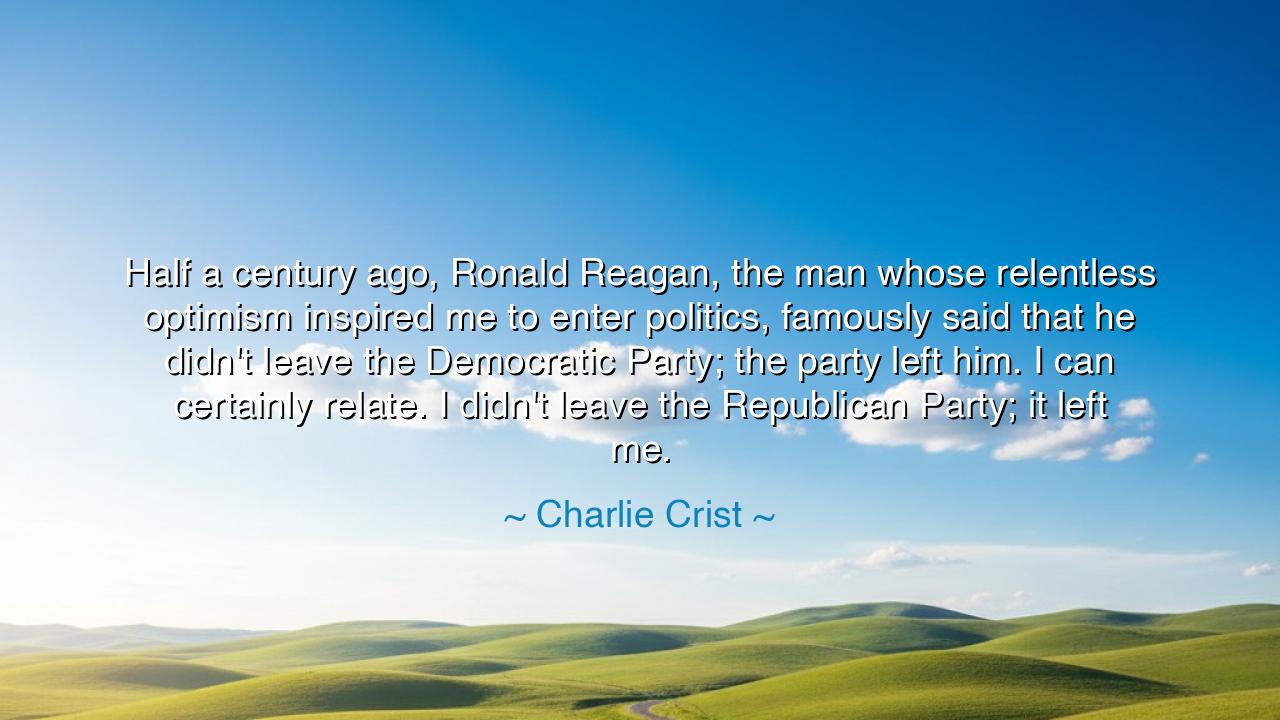
Half a century ago, Ronald Reagan, the man whose relentless
Half a century ago, Ronald Reagan, the man whose relentless optimism inspired me to enter politics, famously said that he didn't leave the Democratic Party; the party left him. I can certainly relate. I didn't leave the Republican Party; it left me.






Charlie Crist’s words—"Half a century ago, Ronald Reagan, the man whose relentless optimism inspired me to enter politics, famously said that he didn’t leave the Democratic Party; the party left him. I can certainly relate. I didn’t leave the Republican Party; it left me."—speak with the sorrow of one who has watched the ground shift beneath his feet. This is not the cry of betrayal alone, but the lament of a pilgrim who once found a home in a cause, only to see that home transformed into something unrecognizable.
At the heart of this declaration lies the truth that parties, like men, are not eternal in their character. They evolve, they bend to time, they turn with the winds of history. A man may remain constant in his principles, yet the banner he once followed may change its colors, leaving him a stranger among former allies. So it was with Reagan, who once called himself Democrat but found his creed of freedom and resilience more welcome beneath the Republican name. And so it is with Crist, who watched the party he cherished wander from the ideals that first called him to service.
History offers many such lessons. In ancient Athens, men who fought for democracy sometimes found themselves cast aside when their city swayed toward oligarchy or empire. Aristides the Just, beloved for his fairness, was exiled not because he abandoned Athens, but because Athens abandoned the virtues he embodied. So too does Crist’s lament remind us: loyalty to principles must outweigh loyalty to parties, for parties are but vessels, while truth endures.
Crist’s words also hold warning. When parties drift so far from their roots that faithful members feel abandoned, it signals not only personal estrangement but a fracture in the body of the nation. The people’s trust depends upon continuity, upon the belief that their causes are represented. If the vessel leaks, the voyage is imperiled. Thus, when Reagan and Crist both declared that their parties had left them, they spoke not only of themselves but of deeper tides pulling at the heart of their republic.
Let this teaching be preserved: never tie your soul to a party so tightly that you cannot see when it has changed beyond recognition. Bind yourself instead to justice, to compassion, to the eternal virtues that do not waver. For optimism and principle outlast the banners of men. And when the house you once served no longer honors them, it is not you who has left—it is the house that has turned away.






DTNguyen Duc Trung
Crist’s view reflects a personal and ideological shift that mirrors a larger movement seen in modern politics. Is this a trend that will continue, where voters and politicians alike feel increasingly disconnected from the parties they once supported? How can political parties adjust to these shifts and reclaim the trust of those who feel abandoned by their once-aligned ideologies?
TThoang tuan tu
Crist’s words resonate with many who feel alienated by the changing nature of political parties. Is the growing disconnection between voters and political parties a sign of deeper issues within the party system itself? What would it take for political parties to recapture the loyalty of members like Crist, who feel as though they no longer fit within the framework of their party’s ideology?
NHnhi huynh
Charlie Crist’s reflection on his shift away from the Republican Party speaks to a broader issue: the fragmentation of political ideologies. If both major parties are shifting away from their founding principles, where does that leave the average voter? Is the current political climate fostering more division, or are we at a point where new political identities and ideologies will emerge to fill the gaps left by these changes?
PMPhi Manh
Crist’s comparison to Reagan’s famous line is telling of how both the Republican and Democratic parties have evolved over time. If parties are no longer reflecting their members’ values, how can they reclaim a sense of shared identity? Can we expect more figures like Crist to switch parties as they seek to align themselves with a platform that better represents their principles, or is this a sign of greater polarization?
TGLe Tri Giai
Charlie Crist’s statement reflects a growing sense of disillusionment that many people feel with political parties. His comment mirrors what we’ve seen across the political spectrum, with individuals feeling that their parties no longer represent their values. Is this shift indicative of larger changes in the political landscape? How can political parties reconnect with their historical roots to better serve the evolving needs of their constituents?